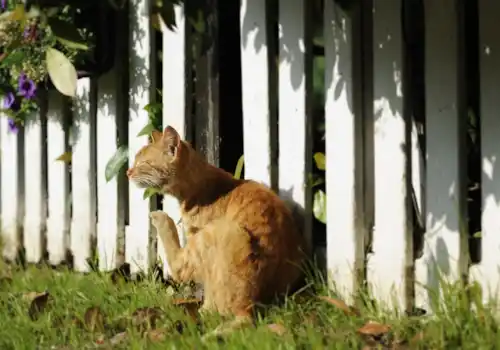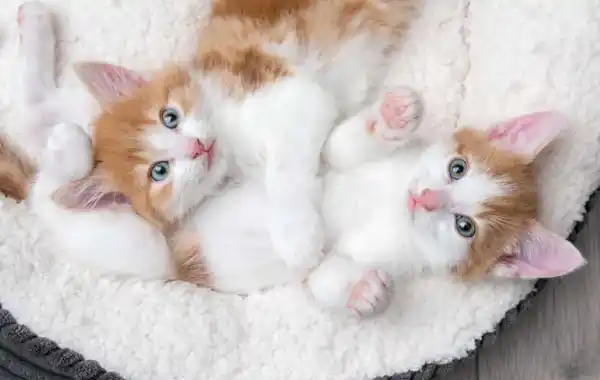A guide to kitten care through the various stages of your kitten's life. How to care for kittens from 4 weeks old kitten care all the way through to 20+ weeks old.
As soon as you bring your kitten home you will need to be thinking ahead for his kitten care plan. Ensure your kittens has had all relevant treatments before you bring him home and then you can book in your essential appointments at your vets. Some vets surgeries might offer a 'new kitten' package, offering you a course of vaccinations, flea and worming treatments, neutering vouchers, plus free samples. So make sure you do plenty of research on which vets you choose and find a practice that feels right and will suit you and your kitten.
Follow our step-by-step kitten care plan to ensure your kitten has everything he needs at every stage of growth to become a happy, healthy adult cat.
4-6 weeks of age - Worming your kitten
Kittens can be born with worms, having been infected through their mother's milk, so they should usually be wormed around this age. In kittens, a mild infestation of roundworms can cause a pot-belly, poor growth, and diarrhoea, while a more severe case can cause nutrient deficiency or a serious intestinal blockage. Vet advice should be sought about any products or treatments that are used at this age.
9 weeks of age - Vaccinations for your kitten
Many non-pedigree kittens are now settling into their new homes and it is time for a visit to the vet. Pedigree kittens usually leave the breeder after they have completed the course of vaccinations but you may still want to have a health check by your own vet. The vet will carry out a thorough health examination checking the skin, ears, eyes, mouth and anus, as well as listening to the heart and chest with a stethoscope.
As their immune systems have not yet matured and they are no longer protected from infection by antibodies found in mum's milk, kittens are vulnerable to disease so the vaccination course should commence.
The exact protocol may vary depending on local disease risks, type of vaccine, and lifestyle. It is usual for kittens to be vaccinated against feline enteritis (panleukopenia), two forms of cat flu (calicivirus and herpesvirus), and feline leukaemia virus. Even indoor cats are advised to receive at least the initial course and cats that go outdoors will need annual booster injections. Vaccinations against other agents, such as chlamydophilia felis (a cause of conjunctivitis) and bordetella bronchiseptica (that causes an infectious cough) are also available, but are not core vaccinations.
Vaccines contain a harmless form of the virus or bacterium that cause particular diseases and work by stimulating the body's immune system. So if your kitten comes into contact with those diseases during his life, the immune system 'remembers' what it did to deal with the vaccine and can fight it.
Many people seem quick to latch on to rumours of untoward vaccine reactions without considering the immense benefits that vaccines have brought in helping to control serious health problems such as feline enteritis, cat flu, feline leukaemia virus infection and, on an international basis, rabies. While it is true that individual reactions can occur, with the purity of modern vaccines they are very uncommon - overall, vaccines contribute greatly to improving the health of the cat population. Read more advice if you're concerned about your cat's vaccinations.

12 weeks of age - Follow up vaccinations for your kitten
Kittens are physically almost 'little adults' at this stage but they do have very special health needs.
It's time for a return visit to the vet as the second part of the initial course of vaccinations is due at around this age (although don't forget that an annual health check and booster vaccination is also required). Any non-urgent health issues that may have arisen since the previous visit can also be dealt with at this stage. Ask your vet how long you should allow before your kitten is allowed outdoors - it varies from one to two weeks depending on the vaccine used.
14 weeks of age - Introducing your cat to the outdoors
If the kitten is to have access to your garden, perhaps with an outdoor run, now is the time that they will start exploring the big wide world, with all the potential dangers it can bring.
Although you may have carried out some pest control during the kitten's early weeks, now is the time to start up a programme of regular preventative care. There are many products that protect against fleas and worms and your vet is the person to advise you. The most modern combine effective flea control and worming in easy to use spot-on formulations, which most owners find far easier to use than the old regime of sprays for fleas and tablets for worms. If you decide to buy over-the-counter products make sure they are suitable for kittens. Some flea preparations are too strong to use on a kitten under the age of six months, so check the labelling. Never use dog flea treatments on cats as many are toxic to felines.
If your youngster arrived with 'visitors' and they have already made themselves at home, you will need to use a household insecticidal spray as well as a product on the kitten. Read more on how to treat your kitten for fleas.

15-20 weeks of age - Neutering your kitten
Neutering is essential to prevent unwanted pregnancies and to reduce male cats' antisocial behaviour. As long as they are healthy and a good weight, kittens can generally be neutered from around four months old. Unless you plan to breed from your kitten, it would be in his best interest to be neutered as soon as possible. Female cats (queens) become sexually mature at somewhere between seven and 12 months of age, although this can be as young as six months. Male cats (toms) tend to mature later, between 10 and 14 months.
In the case of females, womb infections and breast cancer are commonly seen if they are left 'entire', and the strain of repeated calling (oestrus) can lead to a severe loss of condition. Unneutered males who roam over large areas to protect their territory from other cats and to search for a female mate will not only be liable to recurrent abscesses, but will also be prone to picking up diseases that are transmitted as a result of fighting, particularly feline immunodeficiency virus (FIV). Neutered cats have a significantly longer life expectancy.
The operation is quick and simple, and kittens generally bounce back to their usual selves by the next day. Your vet will talk you through the procedure, some vet's also offer neutering vouchers, or even provide the procedure for free if you in receipt of certain benefits. Read more on why you should neuter your kitten.

Microchipping your kitten
Microchipping is highly recommended by veterinary professionals and is often carried out at the same time as the second stage of the initial course of vaccinations. It costs anything from £15 to £30 (though prices can vary) to have a very small microchip injected under the skin in the nape of the neck. It should remain in place for life but it's vital that owners inform the database operator when they move house in order to keep the details up-to-date on the computer database. Some kittens will go to their new homes having already been microchipped, and if this is the case, make sure you contact the microchip company and update your details.
Even if your cat lives his life entirely indoors, it's worth getting him microchipped in case he ever escapes. A microchip is also a legal requirement for obtaining a pet passport and is proof of ownership should there be a dispute over who the cat belongs to.








